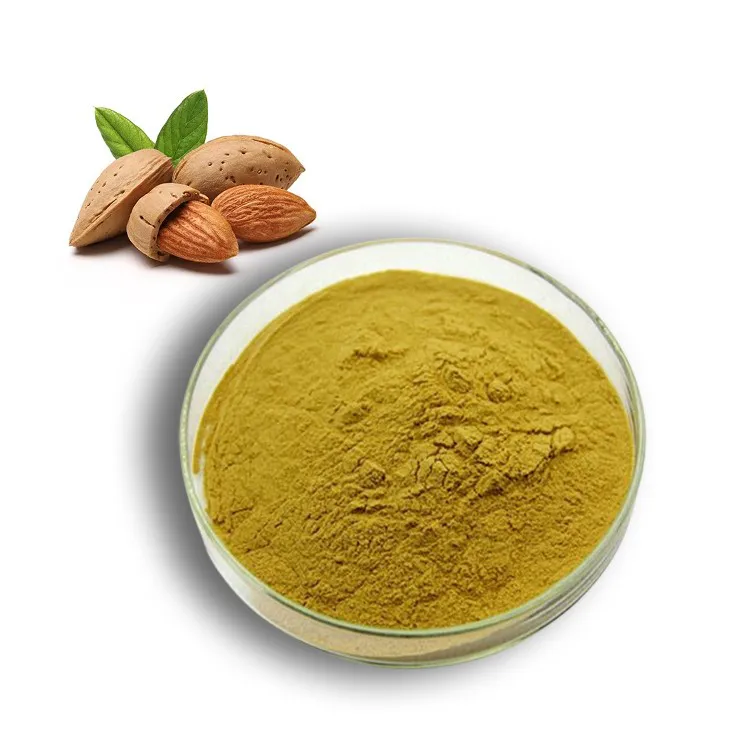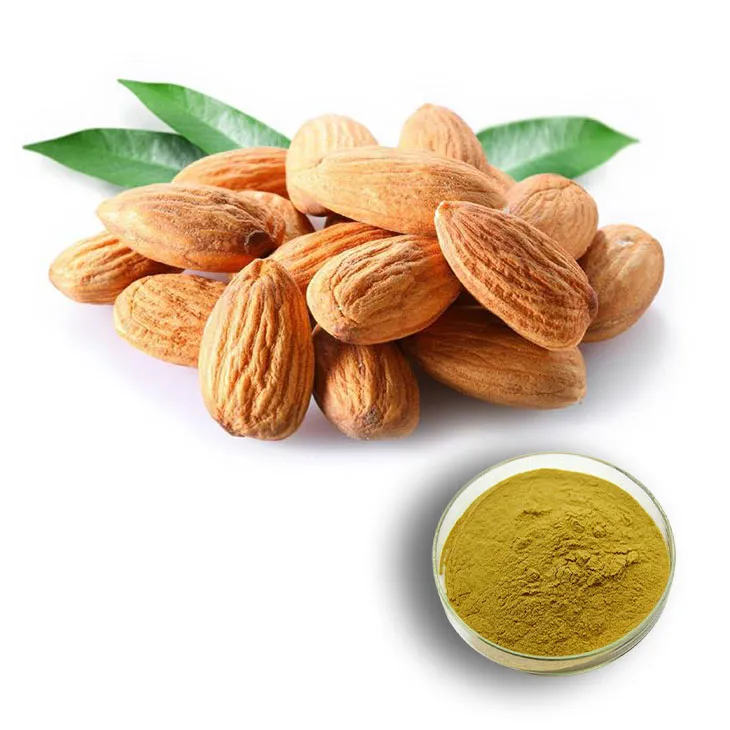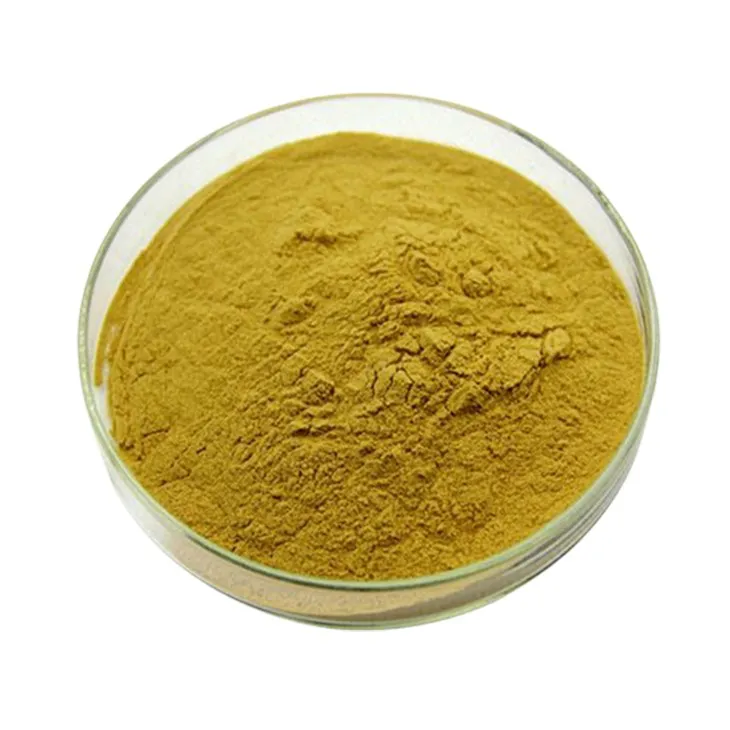- 0086-571-85302990
- sales@greenskybio.com
What is almond extract powder? Definition, types, history and nutritional value.
2024-12-18

1. Definition of Almond Extract Powder
Almond Extract Powder is a fine powder that is obtained through extraction processes from almonds. Almonds, which are the seeds of the almond tree (Prunus dulcis), are rich in various compounds. The extraction process aims to capture and concentrate the flavors, aromas, and some of the beneficial substances present in the almonds. This powder can be used in a variety of applications, mainly due to its distinct almond - like flavor and potential health - promoting properties.

2. Types of Almond Extract Powder
2.1 Natural Almond Extract Powder
The natural almond extract powder is sourced directly from almonds. The process typically involves grinding the almonds into a fine paste or meal, followed by extraction using solvents (such as ethanol) or mechanical pressing methods. This type of extract powder retains the most natural flavors, aromas, and nutritional components of the almonds. It is often preferred in high - quality food and beverage products, as well as in some natural health products, because it is a pure and unadulterated form of almond essence.
2.2 Synthetic Almond Extract Powder
Synthetic almond extract powder, on the other hand, is created through chemical synthesis. Scientists analyze the chemical composition of natural almond flavor and aroma compounds and then recreate them in a laboratory setting. While it can mimic the flavor of natural almond extract powder quite closely, it may not have the exact same nutritional profile. Synthetic almond extract powder is often used in mass - produced food items where cost - effectiveness and consistency of flavor are important factors. However, some consumers may prefer natural products over synthetic ones due to concerns about artificial additives.

3. History of Almonds and Almond Extract Powder
Almonds have a long and rich history that dates back thousands of years. The almond tree is native to the Middle East and South Asia, and evidence of almond consumption has been found in ancient archaeological sites in these regions. Almonds were highly prized in ancient civilizations such as the Egyptians, Greeks, and Romans. They were not only used as a food source but also had cultural and religious significance.
Over time, as technology and food processing techniques advanced, the concept of extracting the essence of almonds in the form of powder emerged. Initially, simple methods such as grinding and infusing almonds in liquids were used. With the development of modern extraction technologies, more refined and concentrated almond extract powders became available. Today, almond extract powder is a common ingredient in kitchens and industries around the world.

4. Nutritional Value of Almond Extract Powder
4.1 Fats
One of the significant components of almond extract powder is its fat content. Almonds are rich in mono - and poly - unsaturated fats. These types of fats are considered "good" fats as they can play a beneficial role in heart health. Mono - unsaturated fats, in particular, can help to reduce levels of low - density lipoprotein (LDL) cholesterol, also known as "bad" cholesterol. By incorporating almond extract powder into the diet, individuals may potentially improve their lipid profiles and reduce the risk of cardiovascular diseases.
4.2 Amino Acids
Almond extract powder also contains essential amino acids. Amino acids are the building blocks of proteins, and essential amino acids are those that the body cannot synthesize on its own and must be obtained from the diet. These amino acids are crucial for various physiological functions, including building and repairing body tissues such as muscles, skin, and hair. They also play a role in enzyme production and immune function.
4.3 Micronutrients
In addition to fats and amino acids, almond extract powder contains important micronutrients. Potassium, for example, is an essential mineral that helps regulate blood pressure and fluid balance in the body. Calcium is another vital micronutrient present in almond extract powder, which is well - known for its role in maintaining strong bones and teeth. These micronutrients contribute to the overall nutritional value of almond extract powder and can help supplement the diet when consumed.

5. Applications of Almond Extract Powder
5.1 Food Industry
In the food industry, almond extract powder is widely used for its flavoring properties. It is a popular ingredient in baking, adding a rich almond flavor to items such as cakes, cookies, and pastries. It can also be used in the production of ice creams, giving them a unique and delicious almond - flavored twist. Almond extract powder can be incorporated into confectionery items like chocolates and candies as well. Moreover, it is sometimes used in savory dishes, such as certain Asian or Middle Eastern cuisines, to add a subtle almond flavor.
5.2 Pharmaceutical Industry
The pharmaceutical industry also shows an interest in almond extract powder. Due to its potential health - promoting properties, it may be used in dietary supplements or natural health products. For example, the presence of healthy fats, amino acids, and micronutrients in almond extract powder could make it a valuable ingredient in products aimed at improving heart health, promoting healthy skin and hair, or enhancing overall immunity. However, more research is needed to fully understand and validate its medicinal properties.
6. Conclusion
Almond extract powder, whether natural or synthetic, has become an important ingredient in various industries. Its unique flavor and potential nutritional benefits make it a valuable addition to many products. Understanding its definition, types, history, and nutritional value helps to appreciate its significance in different applications. As consumer awareness about natural and healthy products continues to grow, the demand for high - quality almond extract powder, especially the natural type, may increase further in the future.
FAQ:
What are the main differences between natural and synthetic almond extract powder?
Natural almond extract powder is directly obtained from real almonds through extraction processes. It contains the natural flavors, nutrients, and compounds present in almonds. Synthetic almond extract powder, on the other hand, is chemically produced to imitate the flavor and some characteristics of the natural one. The natural type may have a more complex and nuanced flavor profile due to the presence of a variety of natural components, while the synthetic one is designed to provide a consistent almond - like flavor but may lack some of the nutritional and other properties of the natural extract.
How is almond extract powder made?
For natural almond extract powder, the process typically involves grinding almonds into a fine paste or powder. Then, through solvent extraction or other extraction methods, the desired compounds are separated from the almond material. In the case of synthetic almond extract powder, it is made through chemical reactions in a laboratory setting. Specific chemicals are combined in a way to create a compound that mimics the almond flavor and certain properties.
Can almond extract powder be used by people with certain dietary restrictions?
It depends on the nature of the dietary restriction. People with nut allergies need to be extremely cautious as even almond extract powder, especially the natural type, may contain allergenic proteins from almonds. However, for those following a low - fat diet, they should be aware that almond extract powder contains fats, although they are mainly healthy unsaturated fats. In the case of vegetarians and vegans, natural almond extract powder is usually acceptable as it comes from a plant source, but they may want to avoid synthetic versions if they are against artificial ingredients.
What are the specific health benefits of the unsaturated fats in almond extract powder?
The mono - and poly - unsaturated fats in almond extract powder can have several health benefits. They can help in reducing the levels of low - density lipoprotein (LDL), also known as bad" cholesterol in the blood. This, in turn, can lower the risk of heart disease. These fats also play a role in providing energy, and they can help in maintaining healthy cell membranes. Additionally, they may have anti - inflammatory properties which can contribute to overall health.
How is almond extract powder used in the pharmaceutical industry?
In the pharmaceutical industry, almond extract powder may be used for its potential health - promoting properties. For example, its nutrient content such as amino acids and micronutrients like potassium and calcium may be utilized in formulating dietary supplements. Also, some of the bioactive compounds present in almond extract powder might have antioxidant or anti - inflammatory effects which could be beneficial in the development of drugs or health products aimed at preventing or treating certain diseases or health conditions.
Related literature
- "Almonds: Composition, Health Benefits, and Applications"
- "The Nutritional and Functional Properties of Almond - Derived Ingredients"
- "Extraction Techniques for Almond Bioactive Compounds: A Review"
- ▶ Hesperidin
- ▶ citrus bioflavonoids
- ▶ plant extract
- ▶ lycopene
- ▶ Diosmin
- ▶ Grape seed extract
- ▶ Sea buckthorn Juice Powder
- ▶ Beetroot powder
- ▶ Hops Extract
- ▶ Artichoke Extract
- ▶ Reishi mushroom extract
- ▶ Astaxanthin
- ▶ Green Tea Extract
- ▶ Curcumin Extract
- ▶ Horse Chestnut Extract
- ▶ Other Problems
- ▶ Boswellia Serrata Extract
- ▶ Resveratrol Extract
- ▶ Marigold Extract
- ▶ Grape Leaf Extract
- ▶ blog3
- ▶ blog4
- ▶ blog5
-
Giant Knotweed Extract
2024-12-18
-
Longan Extract
2024-12-18
-
Horse Chestnut Extract
2024-12-18
-
Okra Extract
2024-12-18
-
Rosemary extract
2024-12-18
-
Chaste Berry Extract
2024-12-18
-
Genistein
2024-12-18
-
Oat Straw Extract Powder
2024-12-18
-
Purple Sweet Potato Extract
2024-12-18
-
Sophora Japonica Flower Extract
2024-12-18





















